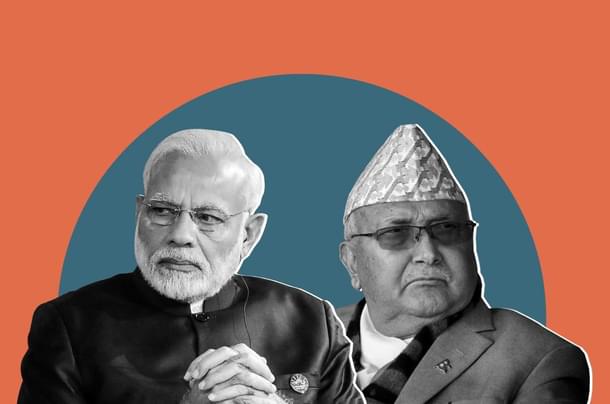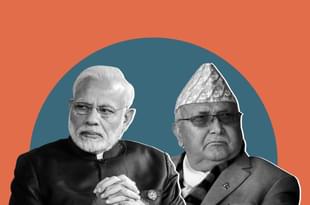World
What’s Keeping India From Inviting Nepal’s PM Oli, Despite His Repeated Requests?
Jaideep Mazumdar
Dec 25, 2024, 01:57 PM | Updated 02:00 PM IST
Save & read from anywhere!
Bookmark stories for easy access on any device or the Swarajya app.


Nepal Prime Minister Khadga Prasad Sharma Oli has been eager to visit India ever since he took office for the fourth time on 15 July this year.
Traditionally, Nepal’s prime ministers make India their first destination. Oli was keen on visiting India in August-September, and both his office and Nepal’s foreign ministry reached out to New Delhi for an invitation.
However, New Delhi showed little interest in hosting Oli. After several requests went unanswered, Oli decided to accept Beijing’s invitation and visited China earlier this month (read this).
Interestingly, Oli’s first official overseas visit was not to China, but to New York for the 79th UN General Assembly.
Oli did meet India’s Prime Minister Narendra Modi briefly on the sidelines of an event, but it was largely a photo-op. It is believed that India agreed to the brief meeting after repeated requests from Nepal, likely as a face-saver for Oli.
Even the readout issued by India was brief, omitting the customary mutual invitations for visits between the two leaders.
Oli’s visit to China, on the other hand, turned into a fiasco (read this) and sparked significant controversy in Nepal, especially after Beijing misled him regarding the financing model for BRI projects in Nepal.
Nepal made another attempt to secure an Indian invitation for Oli during the unofficial visit of Nepal’s foreign minister Arzu Rana Deuba to New Delhi last weekend. Deuba, wife of Nepali Congress president and former Prime Minister Sher Bahadur Deuba, stopped in New Delhi while returning to Kathmandu from a European tour.
Deuba underwent a medical checkup in New Delhi and sought an appointment with Foreign Minister S Jaishankar, but was unable to meet him due to his preoccupation. She also couldn’t meet any other senior ministers or foreign ministry officials.
Instead, she participated in an interaction organised by India Foundation, led by senior BJP leader Ram Madhav, and addressed the Indo-Nepal Economic Forum, urging Indian industrialists and businessmen to invest in Nepal.
Oli and other leaders of the Communist Party of Nepal-Unified Marxist Leninist (CPN-UML) believed Deuba's visit could lead to an invitation for him from New Delhi. During her last visit in August, she met both Jaishankar and Prime Minister Modi, and the Nepali Congress maintains strong ties with Indian political leadership.
Nepal's former foreign minister and CPN-UML deputy general secretary Pradeep Gyawali also visited New Delhi over the weekend to discuss Oli's desire to visit India. However, like Deuba, Gyawali returned to Kathmandu on December 23 without any results.
While Oli was in Beijing earlier in December, his industries and commerce minister, Damodar Bhandari, visited New Delhi to meet Indian counterparts, including Piyush Goyal and Hardeep Puri. Bhandari, a senior CPN-UML leader, spoke with BJP officials about Oli’s intention to improve ties with India.
Despite failing to secure an invitation, Oli announced during a visit to his home district of Jhapa last week that he would visit India soon.
Why Is India Cold-Shouldering Oli
The answer lies in the several missteps made by Oli soon after he took over as Prime Minister in mid-July.
According to a senior officer in the Ministry of External Affairs (MEA), India was keen on welcoming Oli in August or September.
However, Oli set forth conditions that India found impossible to meet. His office conveyed to New Delhi that India should announce the process to resolve the ‘dispute’ over the Limpiyadhura-Kalapani-Lipulekh tri-junction of India, Nepal, and Tibet during his visit.
During his previous term as Prime Minister from February 2018 to July 2021, Oli made an arbitrary claim over a 335-square-kilometre area in Uttarakhand, including Limpiyadhura, Kalapani, and Lipulekh. He even altered Nepal’s maps to include Indian territory, fuelling anti-Indian sentiments within Nepal. Oli also accused India of being a regional bully.
New Delhi speculated that Oli stirred up this controversy to distract from his poor handling of the coronavirus crisis and to fend off growing internal opposition within his own party (read this).
Since then, the Indian political leadership has harboured deep annoyance and suspicion towards Oli. Despite his overtures, New Delhi remains unconvinced about his change of heart.
India perceives Oli as crafty, having repeatedly attempted to play India against China. It is also believed that Oli is aligned with Beijing and will always act in China’s favour.
However, India might have considered welcoming Oli, had he not raised the issue of Limpiyadhura-Kalapani-Lipulekh. Oli’s office had insisted that India should announce the creation of a joint mechanism to resolve this issue, but New Delhi firmly maintains that there is no dispute. India holds that the territory in question is indisputably Indian and has never belonged to Nepal.
By raising this topic, Oli crossed a red line, prompting the Indian leadership to decide against hosting him.
Oli’s office and emissaries then assured New Delhi that he would not raise the dispute over Limpiyadhura-Kalapani-Lipulekh during his visit. However, New Delhi remained unconvinced, primarily due to the belief that Oli is untrustworthy.
The Nepal PM then conveyed to New Delhi his request for India to allow flights to and from Pokhara International Airport and Gautam Buddha International Airport at Bhairahawa to use Indian airspace.
India has denied this request, which is crucial for the viability of both airports, as they were built by China.
Despite repeated warnings from New Delhi, Nepal proceeded with awarding the contracts for building Pokhara and Gautam Buddha International airports to China. India had explicitly told Nepal that it would not allow flights to and from these airports to use Indian airspace.
New Delhi maintains that its stance remains unchanged, as it had cautioned Nepal about the consequences of awarding the contracts to China.
India communicated to Kathmandu that while infrastructure deals in sectors like power, flood control, and others that benefit Nepal could be negotiated, the issues of Limpiyadhura and the use of Indian airspace for flights to or from the Chinese-built airports were non-negotiable.
Oli has not explicitly agreed to India’s conditions, and instead attempted to sidestep them, leading New Delhi to remain suspicious of his intentions.
This is why an invite from New Delhi has yet to materialise for Oli.





